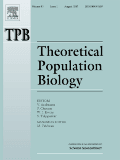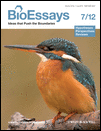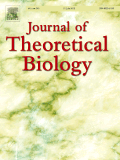
ACTA BIOTHEORETICA
metrics 2024
Cultivating a Rich Repository of Interdisciplinary Research
Introduction
ACTA BIOTHEORETICA is a distinguished academic journal published by Springer, offering a vital platform for the dissemination of research within various interdisciplinary fields including Agricultural and Biological Sciences, Applied Mathematics, Biochemistry, Genetics and Molecular Biology, Environmental Science, and Philosophy. The journal, with its extensive history since its inception in 1935, holds a significant impact factor within its respective categories, ranking Q2 in Agricultural and Biological Sciences and Q1 in Philosophy as of 2023. Its archives, spanning from historical publications to contemporary studies, serve as a rich repository for scholars, professionals, and students dedicated to advancing knowledge in these areas. ACTA BIOTHEORETICA invites contributions that push the boundaries of theoretical exploration and practical application, with the aim of fostering an understanding that bridges science and philosophy. Although not open access, the journal maintains wide accessibility through its integrated digital platforms, enhancing the reach and impact of published work worldwide. Its central office located in Dordrecht, Netherlands further accentuates its international appeal and significance.
Metrics 2024
 0.32
0.32 1.40
1.40 1.20
1.20 39
39Metrics History
Rank 2024
Scopus
IF (Web Of Science)
JCI (Web Of Science)
Quartile History
Similar Journals

AMERICAN NATURALIST
Charting New Territories in Biological UnderstandingAMERICAN NATURALIST, published by University of Chicago Press, stands as a premier outlet for scholarly research in the fields of ecology, evolution, behavior, and systematics. With an impact factor that reflects its high citation rate, the journal has garnered a reputation within the academic community, evidenced by its placement in the Q1 category of its discipline in 2023 and an impressive Scopus rank of #135 out of 721 journals, positioning it in the 81st percentile for Agricultural and Biological Sciences. The journal, established in 1946, continues to uphold its commitment to advancing scientific knowledge through rigorous peer-reviewed articles. Researchers and professionals will find AMERICAN NATURALIST an essential resource, providing insights and discussions that illuminate complex biological phenomena, while fostering a deeper understanding of the natural world. As an essential reading for students and seasoned experts alike, its curated body of work encourages innovative thinking and exploration across an array of ecological and evolutionary topics.

BIOSYSTEMS
Advancing interdisciplinary insights in biological systems.BIOSYSTEMS is a prestigious academic journal published by Elsevier Science Ltd, dedicated to the interdisciplinary fields of applied mathematics, biochemistry, genetics, molecular biology, medicine, modeling and simulation, and statistics and probability. Established in 1967, this journal has carved a niche in presenting innovative research that bridges theoretical and practical aspects of biological systems, making it essential reading for researchers, professionals, and students alike. With a robust impact factor and a Q3 category ranking across various fields, BIOSYSTEMS is recognized for its contributions to advancing scientific knowledge and fostering collaborations among disciplines. The journal's rigorous peer-review process ensures high-quality and impactful articles that address complex biological challenges through quantitative and qualitative methods. As a vital resource for the academic community, BIOSYSTEMS invites submissions that enhance understanding of biosystem processes, enabling readers to stay at the forefront of research trends and applications.

Annual Review of Ecology Evolution and Systematics
Fostering Understanding of Nature's Complex SystemsThe Annual Review of Ecology, Evolution, and Systematics, published by Annual Reviews, is a leading academic journal dedicated to advancing the understanding of ecological and evolutionary processes. With a commendable impact factor and impressive rankings—9th in both the Ecology, Evolution, Behavior and Systematics category and the Environmental Science category—this journal is recognized for its rigorous peer-reviewed articles that synthesize research findings across a wide range of topics within the fields of ecology and evolutionary biology. Established in 2003, this annual publication aims to provide researchers, professionals, and students with comprehensive insights into the latest developments and trends within these dynamic disciplines. By facilitating access to high-quality scholarly articles, the Annual Review of Ecology, Evolution, and Systematics continues to play a crucial role in fostering scientific discourse and discovery.

PHYSICAL BIOLOGY
Pioneering Research at the Nexus of Biology and PhysicsPHYSICAL BIOLOGY is a prominent journal published by IOP Publishing Ltd, focusing on the interdisciplinary field of biophysics, cell biology, molecular biology, and structural biology. Established in 2004, this journal has quickly made its mark in the academic community, currently ranking in the Q2 category in Biophysics and Q3 in Cell, Molecular, and Structural Biology as of 2023. With an ISSN of 1478-3967 and E-ISSN 1478-3975, it serves as a vital platform for disseminating groundbreaking research that bridges physical principles with biological systems. While currently not providing Open Access options, the journal offers access to a wealth of knowledge crucial for researchers, professionals, and students alike who are eager to explore the intricacies of living organisms through a physical lens. Situated in the United Kingdom, PHYSICAL BIOLOGY emphasizes the importance of multiscale approaches and innovative techniques, making it an essential resource for those working at the intersection of physics and biology.

THEORETICAL POPULATION BIOLOGY
Exploring the Depths of Ecological ModelsTHEORETICAL POPULATION BIOLOGY is a leading academic journal published by Academic Press Inc. Elsevier Science, dedicated to advancing the understanding of population biology through theoretical frameworks and models. With an ISSN of 0040-5809 and an E-ISSN of 1096-0325, this journal has been a cornerstone in its field since its inception in 1970. Recognized for its significant contributions to the study of ecological and evolutionary dynamics, it currently holds a Q2 ranking in the Ecology, Evolution, Behavior and Systematics category as per the 2023 category quartiles. Researchers and professionals alike appreciate its role in disseminating impactful findings, as reflected in its percentile ranking of the 51st in Scopus for the Agricultural and Biological Sciences field. While the journal is not open access, it remains a vital resource for those looking to deepen their knowledge and research in theoretical approaches to population biology, making it an essential read for students, aspiring scientists, and veteran researchers seeking to engage with cutting-edge theoretical developments.

Quantitative Biology
Exploring the Intersection of Numbers and NatureQuantitative Biology is a prestigious journal published by WILEY, focusing on the interdisciplinary study of quantitative approaches in the biological sciences. With an ISSN of 2095-4689 and an E-ISSN of 2095-4697, this journal has established itself as a critical platform for researchers exploring complex biological systems through mathematical and computational methodologies. Operating out of China, Quantitative Biology significantly contributes to its field, holding a Q2 ranking in various categories, including Applied Mathematics and Biochemistry, Genetics and Molecular Biology, according to the latest Scopus rankings. These rankings reflect the journal's commitment to publishing high-quality research that employs advanced modeling and simulation techniques. The journal's impact is evident with its position in the 84th percentile for Applied Mathematics, indicating its relevance and growth in a competitive academic landscape. Although it does not currently operate under an Open Access model, the journal is pivotal for professionals and students alike, aiming to bridge the gap between mathematical theories and biological applications. Researchers are encouraged to submit their innovative findings and engage with the vibrant community dedicated to advancing the quantitative understanding of biological phenomena.

THEORY IN BIOSCIENCES
Empowering Researchers through Open Access KnowledgeTHEORY IN BIOSCIENCES, published by SPRINGER, is a prominent academic journal in the interdisciplinary fields of Applied Mathematics, Ecology, and Statistics. With an ISSN of 1431-7613 and an E-ISSN of 1611-7530, this journal is accessible to a global audience and facilitates Open Access options, ensuring that cutting-edge research reaches its intended audience promptly. Established in 1997 and set to converge into 2024, THEORY IN BIOSCIENCES holds a pivotal role in advancing theoretical and methodological approaches in biosciences, evidenced by its respectable placement in the Q3 quartile within the 2023 category rankings. Its Scopus rankings reflect a growing reputation, particularly in Mathematics and Ecology, making it an essential resource for researchers and professionals seeking to enhance their understanding of complex biological systems and data analysis techniques. Positioned in Germany and powered by SPRINGER's esteemed publishing standards, the journal is dedicated to fostering scholarly communication, offering a platform for innovative research that bridges theoretical frameworks and practical applications.

BIOESSAYS
Elevating Knowledge in the Life SciencesBIOESSAYS, published by WILEY, is a leading academic journal dedicated to the dynamic fields of biochemistry, genetics, and molecular biology. With an impressive impact factor and recognized as a Q1 journal in its category for 2023, it ranks 49 out of 221 in the Scopus database, placing it within the 78th percentile among its peers. Since its inception in 1984, BIOESSAYS has served as a vital platform for researchers, professionals, and students, facilitating the dissemination of pivotal findings, innovative theories, and review articles that shape the current understanding of biological sciences. Although it does not offer open access, the journal remains key for those seeking to stay at the forefront of scientific discovery and discussion within this ever-evolving discipline. With its commitment to high-quality, peer-reviewed content, BIOESSAYS continues to influence future research directions and academic discourse.

JOURNAL OF THEORETICAL BIOLOGY
Unraveling Biological Mysteries Through Theoretical FrameworksJOURNAL OF THEORETICAL BIOLOGY, published by Academic Press Ltd - Elsevier Science Ltd, stands as a pivotal source of scholarly research in the domains of theoretical and applied biological sciences. Since its inception in 1961, this esteemed journal has contributed significantly to the advancement of knowledge across various fields, including agricultural sciences, applied mathematics, biochemistry, genetics, immunology, and medical research. With a commendable Q2 ranking in multiple categories for 2023, it showcases robust impact throughout the academic community, reflected in its high Scopus rankings, which place it in the top 25% of journals in several categories. The journal's commitment to fostering interdisciplinary research supports its objective of bridging theoretical frameworks with practical applications, making it an essential resource for researchers, professionals, and students alike. With its wide-ranging topics and a keen focus on innovation, the JOURNAL OF THEORETICAL BIOLOGY is indispensable for those seeking to explore the complexities of biological systems and their mathematical modeling.

npj Systems Biology and Applications
Fostering Collaboration Across Biological Disciplinesnpj Systems Biology and Applications, published by NATURE PORTFOLIO, is a premier open-access journal that has been at the forefront of the field since its inception in 2015. With a commendable focus on the interdisciplinary integration of applied mathematics, biochemistry, computer science, and drug discovery, the journal currently enjoys a Q1 ranking across multiple categories, showcasing its significant impact within the scientific community. In 2023, it ranked 70 out of 635 in Applied Mathematics and holds a notable place in the 89th percentile, confirming its esteemed reputation among researchers. Situated in the United Kingdom, this journal not only promotes innovative research in systems biology but also serves as an essential platform for the dissemination of high-quality studies that delve into modeling, simulation, and the application of biological systems in drug discovery processes. With an open-access model, authors can reach a broad audience, enhancing collaborations and advancing knowledge across disciplines, making it an indispensable resource for researchers, professionals, and students alike seeking to contribute to the evolving landscape of systems biology.